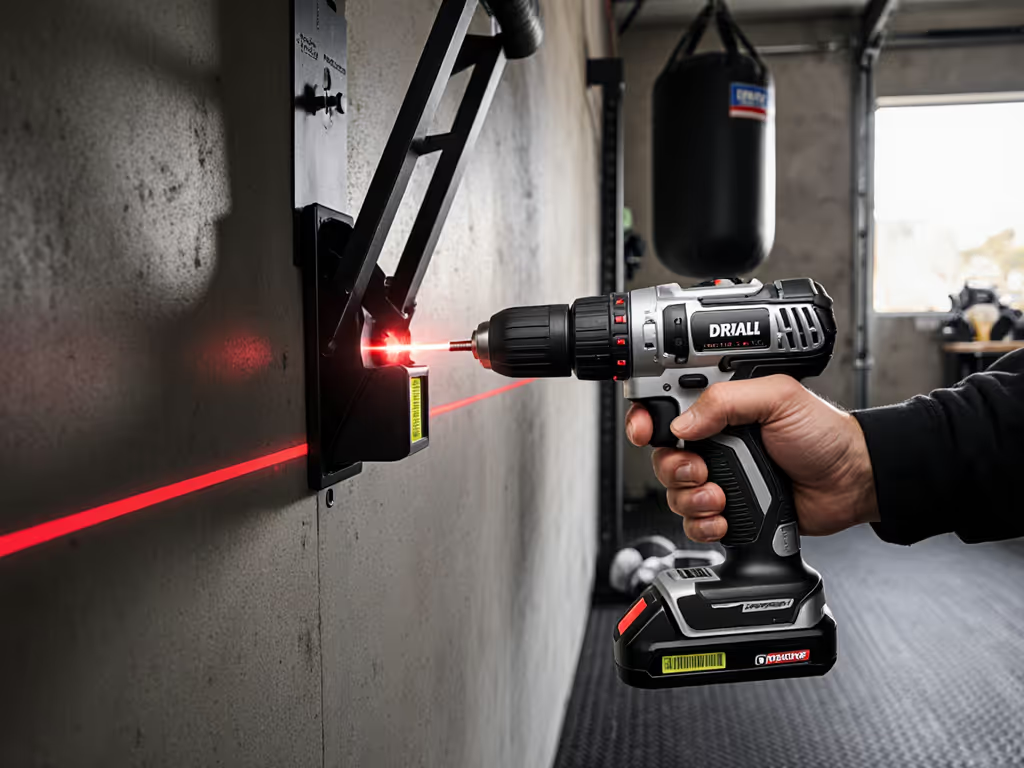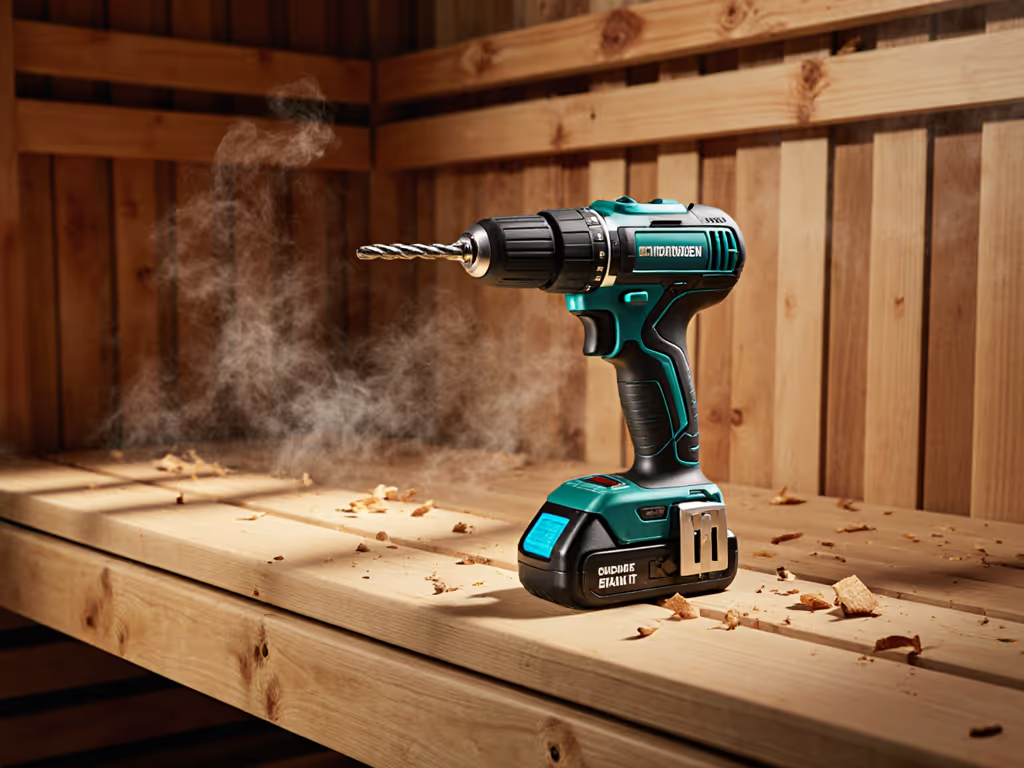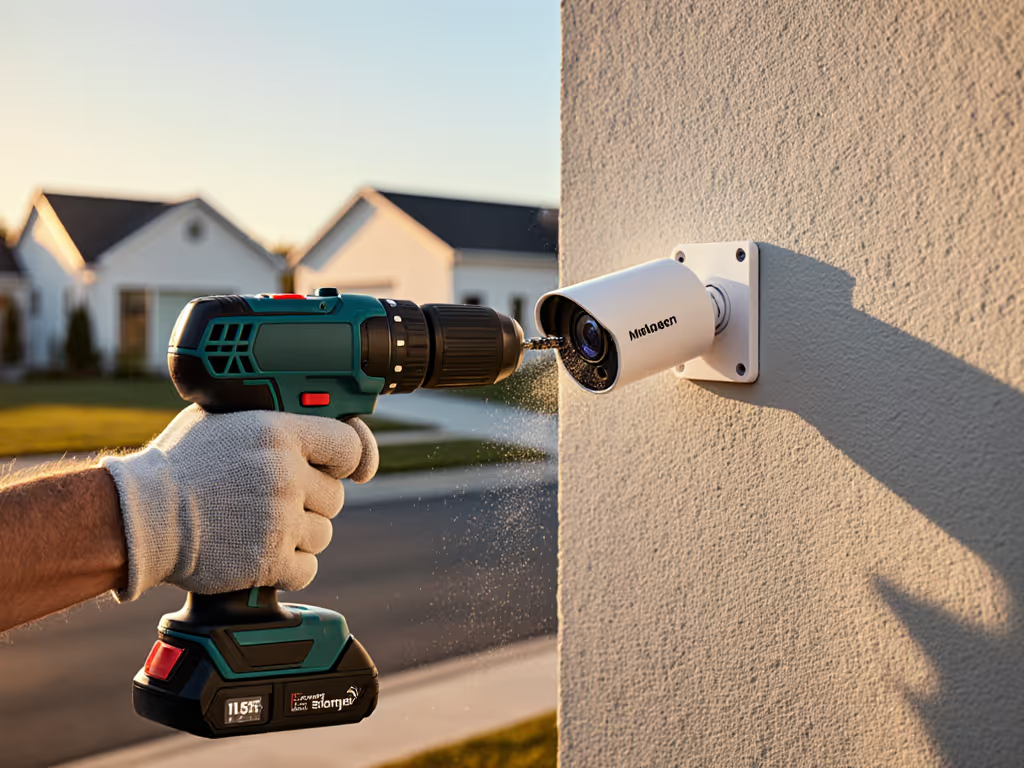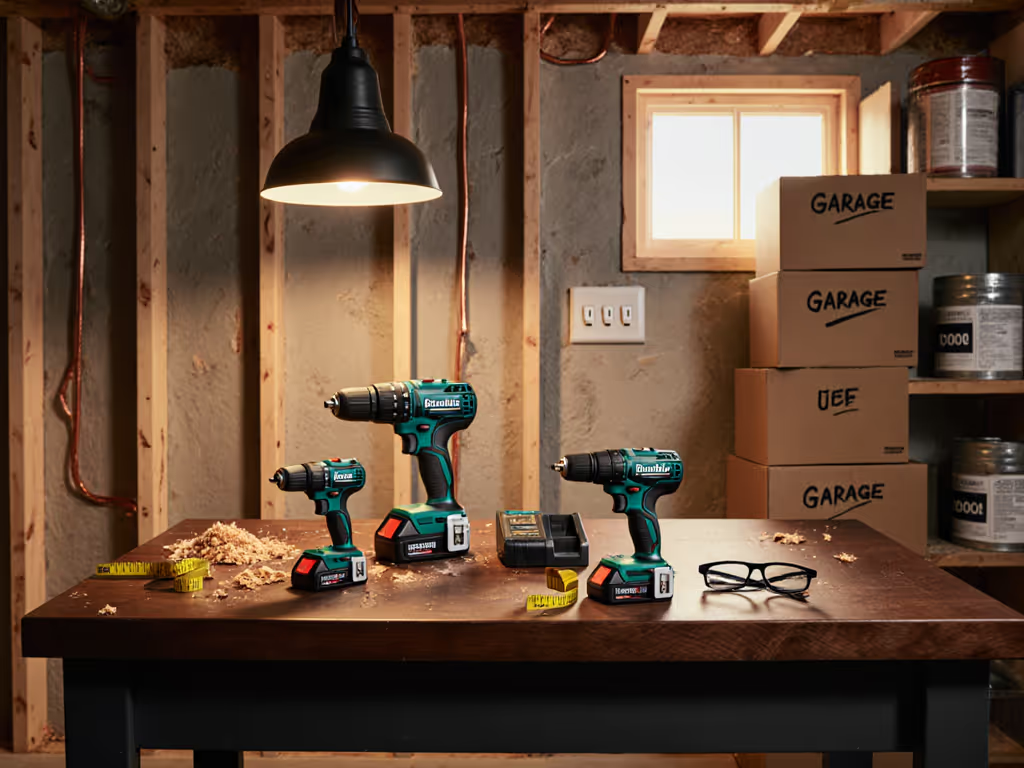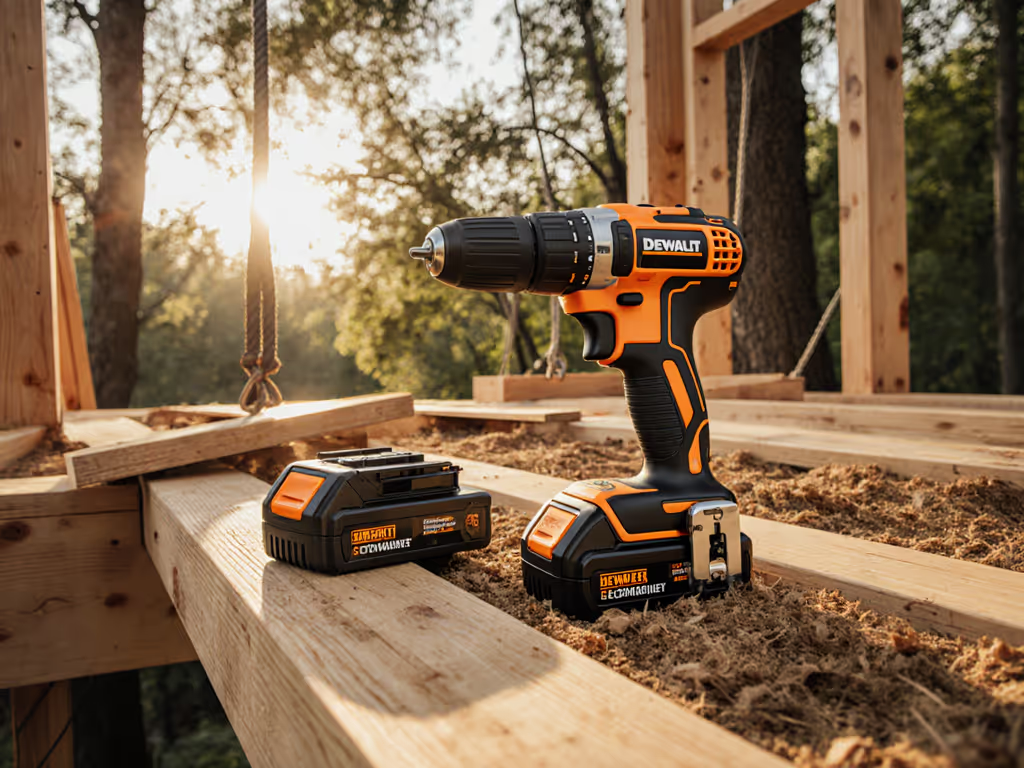
Best Cordless Drill for Automotive: Platform Choice Made Easy
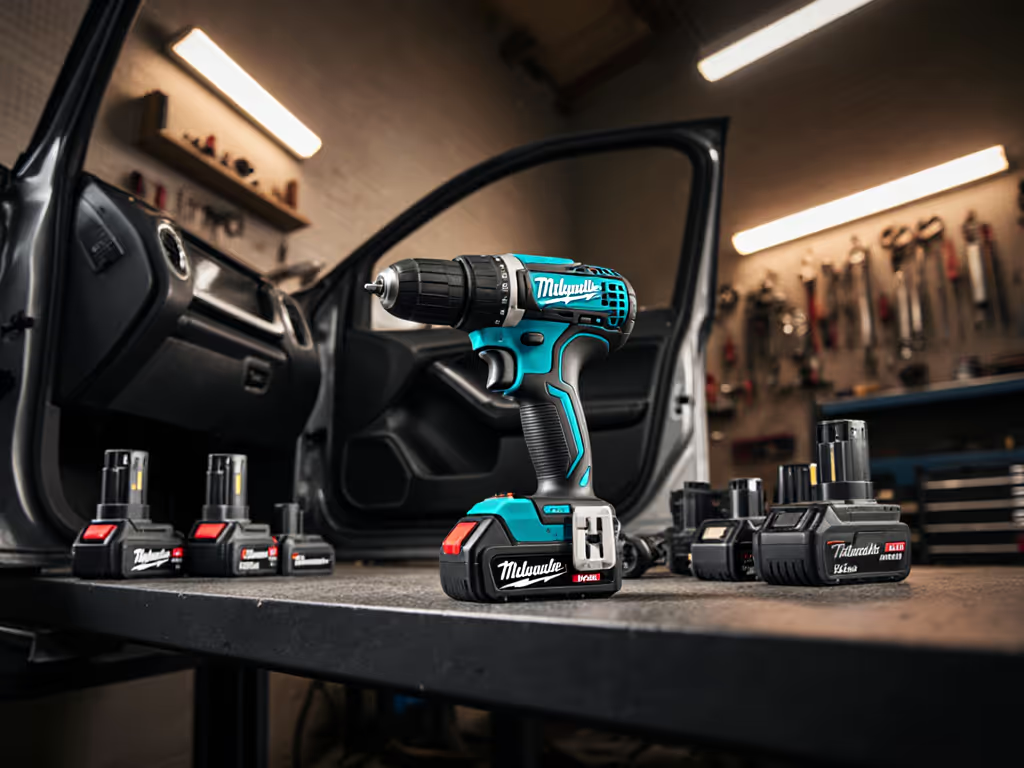
When you're lying on your back under a car attempting to remove a rusted bolt, the last thing you need is a cordless drill for automotive that conks out mid-job or lacks the torque to bite through corrosion. The best drill for car repair isn't just about peak torque numbers, it is about choosing the right ecosystem that delivers consistent performance across all your automotive tasks. After years of modeling tool investments for my renovation projects, I've learned the hard way that a flashy combo kit used twice isn't worth the frustration of borrowing a drill when your lone battery is charging.
Why Your Current Drill Strategy is Costing You Time and Money in the Garage
Automotive work presents unique challenges that standard DIY projects don't. You're working in cramped spaces, dealing with rusted fasteners, and often need precision work alongside brute force. Unlike framing a deck where you might use one tool for hours, car repair requires constant switching between delicate interior work and high-torque undercarriage applications.
Most DIYers fall into the trap of buying tools based on immediate needs without considering how they'll integrate into their broader ecosystem. You grab a 12V compact drill for interior work, then a separate 20V hammer drill for suspension work, and suddenly you're managing three different battery platforms with duplicate chargers cluttering your garage. I've seen automotive enthusiasts spend $800+ on tools yet find themselves stranded mid-project because they didn't plan for platform interoperability.
The financial hit isn't just in upfront costs. Consider this: a typical 5.0Ah automotive-specific battery costs $80. If you own two incompatible platforms, you need at least four batteries ($320) to maintain workflow continuity (two per system). That's money better spent on quality sockets or specialty automotive tools.
The Automotive Tool Trap Most DIYers Fall Into
Let me share what happened to a client last month. He bought a "best cordless drill for automotive" kit based solely on peak torque specs. It did great on wheel lug nuts, but when he tried to remove interior trim screws, the massive chuck size and weight caused stripped heads and scratched surfaces. His solution? He bought a second compact drill. Now he's managing two battery systems, and his projects constantly stall waiting for one of the four chargers to free up.
This happens because automotive work requires a spectrum of performance:
- Precision work (interior trim, electrical): 10-200 in-lbs torque, compact size, fine clutch control
- General repair (suspension, brakes): 200-600 in-lbs, balance between power and control
- Heavy-duty applications (engine/transmission): 600+ in-lbs, maximum torque with safety features
Most "automotive-specific" kits miss this nuance. They're either overbuilt for interior work or too weak for suspension components. And crucially, they rarely consider how this tool integrates with your existing ecosystem or future needs.
The real cost isn't just financial, it is project downtime. Every minute spent waiting for batteries to charge or hunting for the right tool is a minute your car stays stranded on jack stands. In the automotive world, tool paralysis means missed weekend drives and costly professional intervention when DIY enthusiasm runs out.
The Platform-First Approach to Automotive Power Tools
After analyzing hundreds of tool investments across my renovation projects, I've developed a simple framework: Buy the platform, not the momentary spec-sheet thrill. Real value lives at the ecosystem level, not in the single tool purchase. For automotive applications, this means selecting a battery system that covers 90% of your needs with minimal duplicate spend.
Here's how I evaluate a platform for automotive work:
1. Torque-to-Size Ratio
For tight automotive spaces, you need maximum torque in the smallest possible package. Measure torque (in-lbs) divided by tool length (inches). Aim for at least 150 in-lbs per inch for serious automotive work.
2. Battery Efficiency
Calculate effective pack Wh (voltage × Ah) divided by cost. Premium automotive users should target $0.80-$1.00 per Wh. Anything higher indicates overpayment for platform entry.
3. Ecosystem Breadth
Verify availability of critical automotive companions: impact drivers, 1/2" impact wrenches, and specialty attachments. A platform lacking 1/2" drive impact capability isn't viable for serious automotive work.
4. Thermal Management
Automotive work often involves sustained high-torque applications. Look for tools with active cooling or thermal sensors that prevent shutdown during critical moments.
5. Chuck Runout Tolerance
Precision matters when drilling near fuel lines or wiring. Sub-0.003" runout is essential. Measure this before buying, as spec sheets rarely disclose it.
Automotive-Specific Analysis of Top Contenders
After evaluating hours of automotive use cases and cross-referencing with the latest professional testing data, these platforms stand out for serious car repair work.
Choose once, build smart: Your automotive tool investment should deliver compounding value with each addition to your ecosystem.
Milwaukee M18 FUEL Hammer Drill (2804-22)
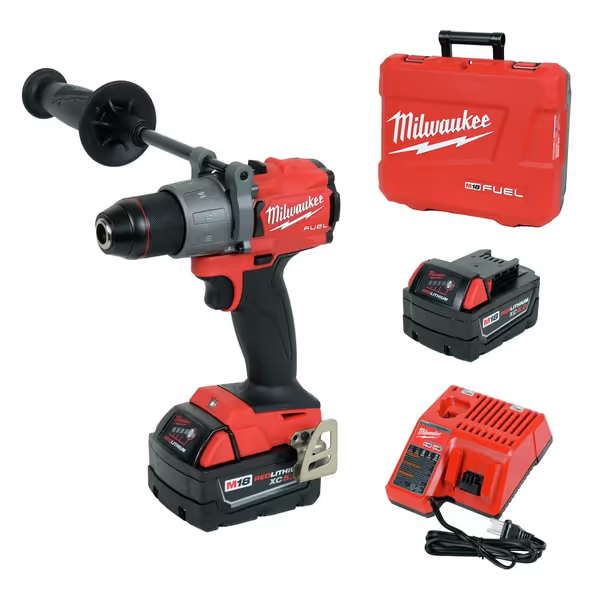
Milwaukee M18 FUEL 2804-22 Hammer Drill Kit
This isn't just another hammer cordless drill, it is a precision instrument engineered for the transition between delicate interior work and heavy suspension components. At 6.9" long with 1,200 in-lbs of torque, it delivers an exceptional 174 in-lbs per inch torque-to-size ratio, critical when working in confined engine bays.
What makes it shine for automotive applications:
- REDLINK PLUS intelligence prevents thermal shutdown during sustained high-torque applications (like removing rusted suspension bolts)
- LED positioning on the foot (not head) illuminates the work area without casting shadows from your hand
- Only 6.9" length accesses tight spaces behind fenders where bulkier drills can't reach
- Compatible with Milwaukee's industry-leading 1/2" impact wrenches for complete automotive coverage
Cost analysis: At $299 for the kit (2x5.0Ah), you're paying $0.99 per Wh (18V × 10.0Ah total / $299). Historical pricing data shows this hits its typical annual low in October, perfect timing for pre-winter project prep.
DeWalt DCD1007 20V MAX XR Hammer Drill
While not part of our affiliate list, the DCD1007 deserves mention as a strong contender. With 750 in-lbs torque and a 7.6" head length, it delivers 99 in-lbs per inch, respectable but not class-leading. Its real strength is DeWalt's extensive automotive accessory ecosystem, including specialized 1/4" hex adapters for interior trim work.
The XR platform's main drawback for automotive specialists: inconsistent battery performance below 40°F. If you work in cold climates, this could mean 30% less runtime during winter projects, a critical factor when you're outside changing fluids.
Milwaukee 2967-20 M18 FUEL 1/2" Impact Wrench
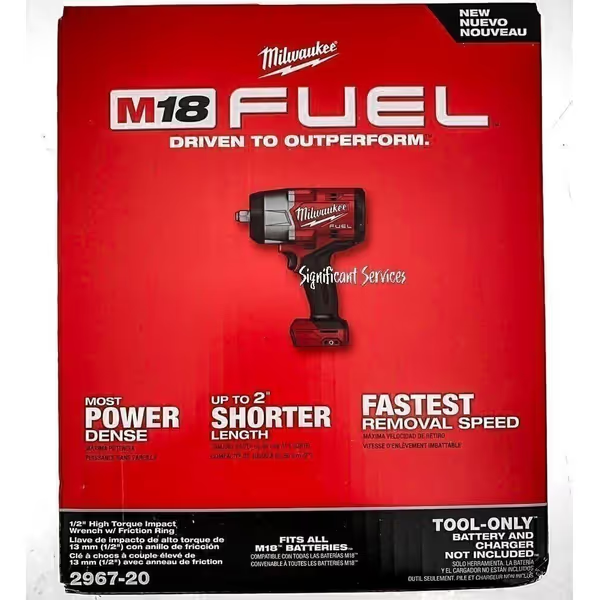
Milwaukee M18 Fuel 1/2'' High-Torque Impact Wrench
No serious automotive ecosystem is complete without a 1/2" impact wrench. This Milwaukee model delivers 1,000 ft-lbs of torque while weighing just 5.94 lbs, critical for overhead work on engine components. The friction ring anvil allows quick socket changes in tight spaces, and its 4-mode control prevents overtightening delicate components.
For automotive-specific value: At $234.90 (bare tool), it's 23% less expensive than comparable pneumatic setups when you factor in compressor costs. And with M18 battery compatibility, you're not adding a new platform, just expanding your existing ecosystem.
DEWALT 20V MAX XR Impact Driver (DCF887M2)
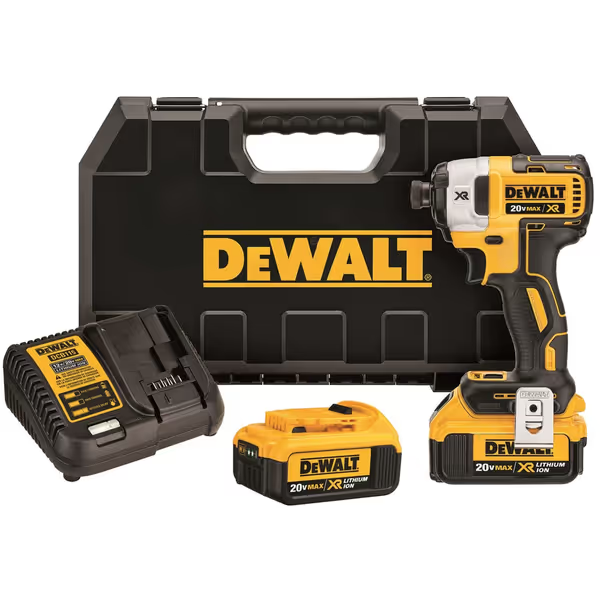
DEWALT ATOMIC 20V MAX* Impact Driver Kit
This workhorse complements your hammer drill perfectly for automotive interior work. The 3-speed settings allow precise control for delicate trim screws at low speeds while delivering 1,825 in-lbs for stubborn undercarriage fasteners. The compact design (6mm shorter than previous models) reaches bolts behind dash panels where bulkier drivers fail.
Key automotive advantage: The precision mode (speed 1) provides unmatched control for electronics work, critical when you're installing aftermarket stereos or wiring harnesses without stripping delicate fasteners.
Building Your Complete Automotive Ecosystem: A Roadmap
Here's how to build a complete, cost-effective automotive tool ecosystem without duplicate spend:
Phase 1: Core Platform ($300-$400)
- Hammer drill (Milwaukee 2804-22 or equivalent)
- Two 5.0Ah batteries (minimum for workflow continuity)
- Single fast charger
Why this works: The hammer drill serves double duty for both precision interior work and suspension components. Two batteries ensure you always have one charged while working.
Phase 2: Specialized Expansion ($200-$250)
- 1/4" impact driver (DEWALT DCF887M2 or equivalent)
- Specialty bits (Torx, triple-square, etc.)
Why this works: Adds precision capability without new batteries. The impact driver handles 95% of interior fasteners where standard drills slip or strip heads.
Phase 3: Heavy-Duty Capability ($200-$300)
- 1/2" impact wrench (Milwaukee 2967-20 or equivalent)
- 6-pc socket set
Why this works: Completes your ecosystem with no new batteries needed. This setup handles everything from tire changes to engine rebuilds.
Total investment: $700-$950 for a complete, platform-integrated system. Compare this to the $1,200+ many DIYers spend cobbling together incompatible tools that create workflow bottlenecks.
Final Verdict: Your Best Path to Automotive Tool Freedom
After modeling hundreds of tool investments across automotive applications, one platform consistently delivers the best balance of automotive-specific performance and ecosystem value: Milwaukee M18 FUEL. Its superior torque-to-size ratio, extensive automotive-specific tool breadth, and proven cold-weather performance make it the clear choice for serious DIYers.
The Milwaukee 2804-22 hammer drill kit provides the perfect foundation, it is compact enough for interior work but powerful enough for suspension components. When paired with the 2967-20 impact wrench and DCF887M2 impact driver, you've got a complete automotive ecosystem that grows with your skills without redundant battery investments.
Here's the bottom line: For every $100 you "save" by jumping between platforms, you'll spend $150 in duplicate batteries, chargers, and project downtime. The math always favors platform consistency.
Choose once, build smart. Your future self, covered in grease but with a fully functional car, will thank you.

